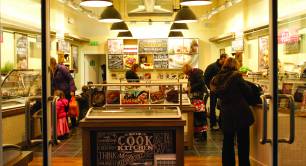B Corp founders reveal impact to date
There was a chance to find out how the B Corps people are getting on one year on from launching in the UK at a session put on by Marmalade, the fringe event that happens alongside the Skoll World Forum.
The B Corp certification is to businesses what fair trade is to coffee, the team describes. For profit companies get to call themselves B Corps if they meet rigorous standards of social and environmental performance, accountability and transparency.
Pioneers Post reported on the launch of B Corp UK back in September last year. B Lab UK was incorporated as a company limited by guarantee in January 2015 and charity status for its associated non-profit B Lab followed from the charity commission in November 2015. The organisation has been operating for longer in the US – the first cohort of B Corps were certified in 2007 over there.
Founders Bart Houlahan, Jay Coen Gilbert and Andrew Kassoy started off the session at Marmalade with some headline figures. There are now certified B Corps in 48 countries in 150 different industries; there are 3,000 B Corps in the US and around 40,000 organisations are using its impact assessment tool.
This suggests that, even if companies are not putting themselves through the application process, they are wondering how their impact measures up. Reflecting on where they are now compared to when they started, Gilbert said: “There is definitely a lot more inbound traffic.”
Accordingly, there was much discussion about the ripple effect of there being a certification that companies can use to prove that they care about more than just their share price. The UK launch was marked by interest from Unilever, which the trio said had been catalytic in attracting companies of a similar size.
Greyston bakery became a B Corp, which inspired Ben & Jerry’s to become a B Corp, which then got Paul Polman (chairman of Unilever) on board.
Credit was given to social enterprises for doing their bit. Gilbert mentioned Greyston Bakery as an example, which hires ex-offenders to make the brownies that go into Ben & Jerry’s ice cream. “They don’t hire people to make brownies, they make brownies to hire people,” said Gilbert.
Gilbert claimed that “almost all of the mainstream venture community has invested in a B Corp,” with Greyston being one of them. “A lot of those tech start ups like to see themselves as part of the same community, it keeps it real for them. At the same time Greyston likes being associated with those business because they see it as having an influence on a more mainstream part of the economy and they can partner with those businesses.”
Gilbert went on to say that it was this ripple effect that had brought Unilever (which own’s Ben & Jerry’s) to the table. “Greyston bakery became a B Corps, which inspired Ben & Jerry’s to become a B Corps, which then got Paul Polman (chairman of Unilever) on board."
The three founders want to be transparent about the certification's sustainability, revealing that, at present half of its income comes from the fees they charge for certification, with the other 50% coming from philanthropic sources.
Before the close of the session, Cliff Prior of Big Society Capital asked a question about working with government and in doing so, intriguingly revealed: "We're about to have a government-led, mission lead business review, the scope of which is looking awfully like B Corps, at least as a movement." More details about this consultation on 'profit with purpose' businesses, which were a key part of the conclusions drawn by the G8 Social Impact Investment Taskforce, are expected to be announced in the coming months.
Photo credit: James Cridland



